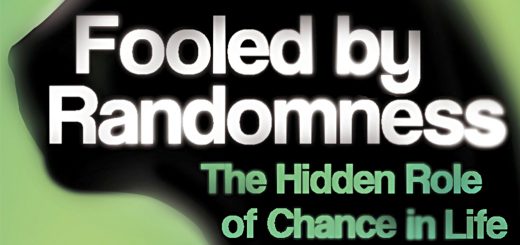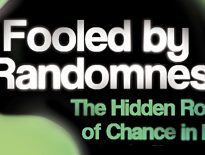Fooled By Randomness 1 – Solon’s warning & alternative accounting

Today’s post is our first visit to a new book – Nassim Nicolas Taleb’s modern classic Fooled By Randomness.
Contents
Nicolas Nassim Taleb
Nicolas Nassim Taleb is probably most famous for writing The Black Swan.
- Fooled by Randomness is his first book.
From the author’s page of the book:
Nasim Nicholas Taleb has devoted his life to immersing himself in problems of luck, uncertainty, probability and knowledge. Part literary essayist, part empiricist, part no-nonsense mathematical trader, he is currently the Dean’s Professor in the Sciences of Uncertainty at the University of Massachusetts at Amherst.
Fooled by Randomness
The book is about the impact of randomness on life, or as Taleb puts it:
Luck disguised and perceived as non-luck (that is, skills) and, randomness disguised and perceived as non-randomness (that is, determinism).
From this, we derive the lucky fool, who attributes his success to something other than the luck which is truly responsible.
- Since Taleb is an options trader by profession, the book is also about the markets.
The two issues that are central for Taleb are:
- Induction (the black swan), and
- Skewness – “It does not matter how frequently something succeeds if failure is too costly to bear.”
Hard work and determination
The message of the book is “it is more random than we think” rather than “it is all random.”
- Not everyone is lucky (or unlucky), but a lot of people are, though Taleb points out that:
Of course chance favors the prepared! Hard work, showing up on time, wearing a clean (preferably white) shirt, using deodorant, and some such conventional things contribute to success – they are certainly necessary but may be insufficient as they do not cause success.
Persitence is also necessary.
- But both of these counts less in the more random environments (Taleb often contrasts the markets with dentistry).
And in random spaces, you should definitely seize opportunities when they appear, since a few well-taken chances can have a disproportionate effect on your eventual success.
Millionaires
Taleb uses the book The Millionaire Next Door to illustrate the problem with reversing the logic of causality – what he calls affirming the consequent.
- Since the millionaires in the book were of average intelligence, the author concludes that the areas where they stand out from the general population – hard work and tenacity – must be responsible.
Taleb says instead that hard work and tenacity are prerequisites, and luck then made a subset of this group into millionaires.
- Otherwise, all persistent hard workers would be millionaires.
The book’s author also noted that the millionaires had a taste for risk-taking.
- Taleb notes that this cuts both ways – the same finding would come from a study of bankrupts.
Survivorship
Another of Taleb’s key points is that of survivorship.
- If a lot of people set out to do something and a few succeed, it does not mean that the winners are all geniuses.
I am not saying that Warren Buffett is not skilled; only that a large population of random investors will almost necessarily produce someone with his track records just by luck.
Confusion
Taleb provides what he calls a Table of Confusion, which shows how things can be misinterpreted.
Amongst the most relevant lines are:
- Luck seen as Skills
- Randomness as Determinism
- Probability as Certainty
- Belief/Conjecture as Knowledge/Reality
- Theory as Reality
- Coincidence as Causality
- Survivorship Bias as Skilled Investing
- Contingent as True in all possible worlds.
Tragic or Utopian
Taleb distinguishes between the Utopian Vision:
That we should overcome cultural impediments on our way to becoming a better human race–thinking we can control our nature at will and transform it by mere edict.
And the Tragic Vision:
That believes in the existence of inherent limitations and flaws in the way we think and act and requires an acknowledgment of this fact as a basis for any individual and collective action.
I know which side I’m on.
- On the tragic side, Taleb counts Popper, Hayek, Friedman, Adam Smith, Kahnemman and Soros as colleagues.
I’d like to add my favourite quote from Kant:
Out of the crooked timber of humanity no straight thing was ever made.
Solon
Another of my favourite quotes comes from Solon:
The observation of the numerous misfortunes that attend all conditions forbids us to grow insolent upon our present enjoyments, or to admire a man’s happiness that may yet, in course of time, suffer change. Him only to whom the divinity has [guaranteed] continued happiness until the end we may call happy.
This is sometimes shortened to:
Count no man happy until he be dead.
Taleb says the modern equivalent is Yogi Berra’s:
It ain’t over until the fat lady sings.
For Taleb, the point is that things that come easily (through luck) can be easily taken away.
- Things that have little help from luck are more resilient.
Nero
Taleb uses an alter ego called Nero Tulip in the book.
- He’s a defensive-minded proprietary trader, albeit one with better social skills than Taleb allows himself.
He never puts himself in a situation where he can lose more than, say, $1 million – regardless of the probability of such an event.
He takes small losses and expects his large winners to cover them.
Nero averages $500K pa in after-tax earnings.
- He keeps his own money in Treasury bonds since he doesn’t trust the stock market.
Other traders who take more risks will beat him in any given year, but they usually blow up (lose everything and leave the business) after a few years.
John
The exemplar of this other type of trader is John, who lives across the street from Nero.
- John trades junk (high yield) bonds.
He’s none too bright, but he’s younger and makes more money than Nero – by taking more risk.
- He’s flashy too, with a bigger house and lots of expensive cars.
Most people prefer to make $70,000 when others around them are making $60,000 than to make $80,000 when others around them are making $90,000. Economics, schmeconomics, it is all pecking order [thought Nero].
John’s trading style has negative skew – the regular small wins are accompanied by rare large losses.
- It’s often known as “picking up pennies in front of a steamroller”.
Taleb hates this approach, and it’s true that allocating all of your capital in this way would be stupid.
But people hate losses, and so there is a profit to be made from selling them insurance against these losses.
- Out-of-the-money options are mispriced, and sellers (writers) have a positive expected return.
They just need to be prepared for the inevitable crash, which will come at the worst possible time (when the wider markets are down).
In the end, of course, John blows up.
Many lives
Taleb makes the point that success must be judged against the set of possible paths (lives) which that practitioner might have taken.
- Nero’s conservative approach means that he has little prospect of not doing moderately well.
- John’s aggressive approach means that his most likely path is to do very well for a time and then blow up.
This is reminiscent of the approach we need to take when calculating a safe withdrawal rate from our retirement pot.
- It’s the worst-case scenario which is relevant since we can’t afford to run out of money.
Using Taleb’s analysis, a dentist is richer than a rock star or actor, since the majority of the latter two groups are waiting tables or flipping burgers.
Alternative accounting
Decisions and performances cannot be judged by the outcome, only by the likely outcome(s) when the decision was taken.
Taleb uses an imaginary Russian roulette tournament where winners receive $10M.
- Since people see wealth but not the generator of wealth, winners would be seen as role models.
- If the game were to be played once a year, those who won six or seven times in a row would be widely celebrated.
$10 million earned through Russian roulette does not have the same value as $10 million earned through the diligent and artful practice of dentistry. One’s dependence on randomness is greater than the other.
The gun of reality has more chambers than the revolver in Russian roulette.
- So there are many more possibilities, and the extreme negative event is much less likely and therefore less expected. (( Taleb contends that Black Swans can be positive events, but since his book, they are popularly viewed as negative ))
The second difference is that not all alternatives have an equal probability.
- Many of the probabilities may be unknown or uncertain.
The Janet problem
Taleb ends Chapter 2 of the book with the Janet problem, so-called because the imaginary bank teller (( Or possibly a librarian )) in the original Kahneman experiment was named Janet.
Subjects famously judged it more likely that Janet – who had left-wing views – was a feminist bank teller than that she was merely a bank teller.
- Since all feminist bank tellers are contained within the group of bank tellers, this is clearly the wrong answer.
Taleb provides two more examples of how specificity trips us up:
- people would rather have travel insurance that protects against terrorism than insurance that protects against all causes of death
- people think that a deadly flood in California is more likely than a deadly flood in the whole of North America
People do not like to insure against something abstract; the risk that merits their attention is always something vivid. Both risk detection and risk avoidance are not mediated in the “thinking” part of the brain but largely in the emotional one.
Taleb says that this explains the hysterical tone of much journalism – it’s the easiest way to grab your attention.
- He compares the coverage of mad cow disease with that of road deaths.
Proverbs
Taleb distrusts proverbs.
Most poetic sounding adages are plain wrong. I remind myself of Einstein’s remark that common sense is nothing but a collection of misconceptions acquired by age eighteen.
Almost all the smart things that have been proven by science appeared like lunacies at the time they were first discovered.
Einstein’s quote comes to mind:
Everything should be made as simple as possible, but no simpler.
Conclusions
That’s it for today – we’ve covered the Preface, the Prologue and the first two chapters of the book.
- It’s a dense read, and I think that we’ll need six or seven articles to get through it.
Up next are mathematical history and randomness in science.
- Until next time.















